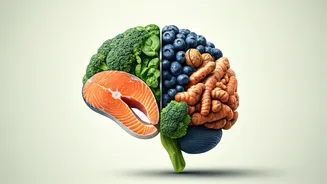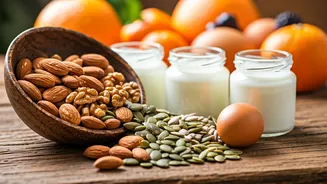Boosting Brainpower Naturally
The first step toward strengthening your memory and enhancing your brain's overall function involves understanding the power of a brain-healthy diet. Incorporating
specific foods into your daily meals provides the necessary nutrients that your brain craves. These foods are not just ordinary ingredients; they are loaded with vitamins, minerals, and antioxidants that protect your brain cells from damage and boost their performance. Choosing the right foods can lead to improved memory, enhanced focus, and a clearer mind. The following sections will introduce you to ten such foods, revealing their benefits and how they can be easily integrated into your regular eating habits. These choices make a real difference, assisting you in achieving better mental sharpness and a higher quality of life.
Fatty Fish: Omega-3 Power
Fatty fish, such as salmon, tuna, and mackerel, are renowned for their high omega-3 fatty acid content. These essential fats are vital for brain health. Omega-3s form the building blocks of brain cell membranes, supporting the structure and function of your brain. Consuming omega-3-rich fish can lead to a reduction in cognitive decline, and it helps improve memory recall and overall brain function. The brain utilizes these fats to build and maintain brain cells, and low levels of omega-3s are linked to cognitive decline and a decline in memory, and this is why including fatty fish in your diet is highly beneficial. Aim to consume these fish at least twice per week to experience their full benefits, which also offers the advantage of promoting overall health.
Blueberries: Antioxidant Boost
Blueberries are often cited as a brain-boosting superfood, and for a good reason. They are packed with antioxidants, particularly flavonoids, which protect the brain from oxidative stress and free radical damage. This damage can contribute to age-related cognitive decline and memory loss. The antioxidants in blueberries help to reduce inflammation and enhance communication between brain cells, leading to improved memory, focus, and learning abilities. Regular consumption of blueberries has been associated with improved cognitive performance and a reduced risk of neurodegenerative diseases. Whether you add them to your morning cereal, blend them into a smoothie, or simply enjoy them as a snack, blueberries are an easy and delicious way to support brain health.
Turmeric: Curcumin's Magic
Turmeric, a spice commonly used in Indian cuisine, contains curcumin, a powerful compound with potent anti-inflammatory and antioxidant properties. Curcumin has been shown to cross the blood-brain barrier, directly benefiting brain cells. It helps to enhance memory, reduce symptoms of depression, and promote the growth of new brain cells. The anti-inflammatory effect of curcumin protects the brain from damage and aids in maintaining optimal cognitive function. Incorporating turmeric into your diet can be as easy as adding it to curries, soups, or even mixing it into your morning coffee. Consuming turmeric, particularly when combined with black pepper to boost absorption, can significantly enhance your brain health.
Broccoli: Vitamin K Benefits
Broccoli, a cruciferous vegetable, is rich in vitamin K, a nutrient essential for cognitive function and brain health. Vitamin K helps improve memory and cognitive performance by supporting brain cell structure and function. Broccoli also contains antioxidants that protect brain cells from damage. Regular consumption of broccoli can contribute to overall brain health, potentially slowing cognitive decline and improving memory recall. Incorporating broccoli into your diet through steaming, roasting, or adding it to stir-fries provides a wealth of benefits for both your physical and cognitive well-being. The abundance of nutrients found within this vegetable makes it a valuable asset in maintaining a healthy and functional brain.
Pumpkin Seeds: Zinc Power
Pumpkin seeds are a powerhouse of nutrients, particularly zinc, which is crucial for cognitive function. Zinc plays a vital role in nerve signaling and communication in the brain, supporting memory and learning. Pumpkin seeds also contain other essential nutrients such as magnesium, iron, and antioxidants, which are beneficial for brain health. Eating pumpkin seeds as a snack, adding them to salads, or incorporating them into your trail mix is a convenient and effective way to boost your zinc intake and support your brain's cognitive functions. Their nutritional value makes them a tasty and effective addition to any diet geared towards cognitive enhancement and maintaining a sharp memory.
Dark Chocolate: Flavanol Delight
Dark chocolate, particularly that with a high cocoa content, contains flavanols, antioxidants that have a positive effect on the brain. Flavanols improve blood flow to the brain, which enhances cognitive performance and memory. Dark chocolate can also improve mood, focus, and alertness. These compounds have been shown to help with improving memory, focus, and even mood. Dark chocolate consumption should be done in moderation as it still contains calories, but its benefits for brain health make it a worthy treat. Choosing dark chocolate with a high cocoa percentage can provide both a delicious snack and a significant cognitive boost, benefiting the brain's overall function and your well-being.
Oranges: Vitamin C Boost
Oranges are excellent sources of vitamin C, an antioxidant that protects the brain from free radical damage. Vitamin C is also important for cognitive function and the synthesis of neurotransmitters, which are essential for brain communication. Consuming oranges or other vitamin C-rich fruits can help maintain a healthy brain, enhance memory, and protect against cognitive decline. This means it is highly important to take vitamin C to help your brain function at its highest ability. Include oranges in your daily diet, either as part of a meal or a snack, to harness the cognitive benefits provided by vitamin C, making this a healthy and delicious choice.
Nuts and Seeds: Vitamin E
Nuts and seeds, such as almonds, walnuts, and sunflower seeds, are rich in vitamin E, an antioxidant that helps protect brain cells from oxidative stress. Vitamin E is crucial for maintaining memory and cognitive function, and its antioxidant properties shield brain cells from damage. Including a variety of nuts and seeds in your diet provides essential nutrients and boosts brain health. The antioxidants present in these foods help maintain brain health, improve cognitive function, and decrease the risk of cognitive decline as you age. Enjoying a handful of nuts and seeds as a snack can be an easy way to get a daily dose of vitamin E for optimal brain function.
Eggs: Choline Powerhouse
Eggs are a great source of choline, a nutrient vital for brain health and memory. Choline is used to produce acetylcholine, a neurotransmitter that helps with learning and memory function. Consuming eggs supports the creation of neurotransmitters, which are crucial for brain function, and improves cognitive performance. Including eggs as part of your regular diet helps to ensure a sufficient intake of choline, supporting optimal memory and brain function. Eggs, when consumed as part of a balanced diet, make them a great source of nutrients that can significantly enhance brain function and help you maintain a healthy and active mind.




















